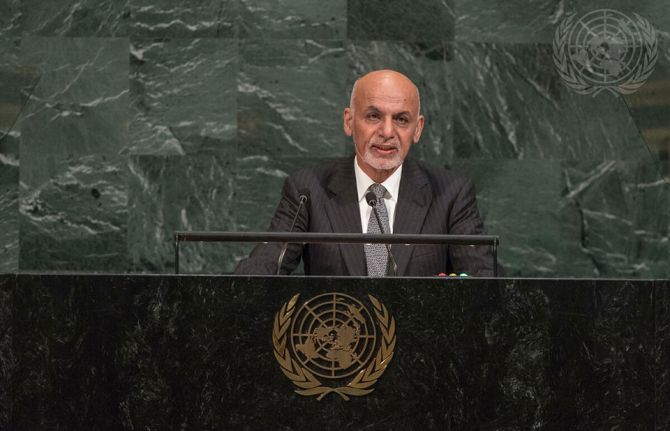

Feature Story
President of Afghanistan declares ‘unwavering support’ for a People’s Vaccine for COVID-19
01 April 2021
01 April 2021 01 April 2021The President of Afghanistan, Mohammad Ashraf Ghani has joined world leaders and experts in an appeal for equitable and fair distribution of COVID-19 vaccines.
In a letter to the People’s Vaccine Alliance, President Ghani outlined that despite the numerous challenges Afghanistan continues to face as a country caught in conflict, Afghanistan has witnessed fewer human losses caused by the COVID-19 pandemic compared to other countries. However, the President underscored that this did not mean that the resulting implications were underestimated or ignored.
“We must put in place all possible efforts to maximize the supply of vaccine so that everyone, everywhere can benefit as quickly as possible,” said President Ghani. “I assure you of my unwavering support to the People’s Vaccine Alliance.”
In the letter he urges fellow leaders to urgently develop a common plan to massively scale up manufacturing of the vaccine. Which would not only save millions of lives, but also build capacity and infrastructure in countries around the world to manufacture medicines and vaccines to help achieve universal health coverage and prepare for future health emergencies.
He also urged fellow leaders—especially leaders in high-income countries—to insist that the vaccine technology and know-how is shared through the World Health Organization's Covid-Technology Access Pool, and that leaders unite to strongly support the proposal made by India and South Africa to the World Trade Organization to waive patents during the pandemic.
The President of Afghanistan joins more than 150 leaders and advocates globally who have signed up to be part of the People’s Vaccine Alliance including the President of South Africa and the Chairperson of the African Union Commission, the Presidents of Ghana and Senegal, the Prime Minister of Pakistan, the Director of the Africa Centres for Disease Control and Prevention and the Special Rapporteur on the right of everyone to the enjoyment of the highest attainable standard of physical and mental health.
“EMERGENCY and all the members of People Vaccine Alliance advocate for equal access to the vaccines: while millions of people who have already been vaccinated in the United States, the United Kingdom or European countries feel safer, most of the low-income countries will barely be able to vaccinate one out of 10 people in 2021 due to the inaccessibility of vaccines,” said Rossella Miccio, President of EMERGENCY.
The People’s Vaccine Alliance calls on pharmaceutical corporations and governments to:
- Prevent monopoly on vaccine production by making public funding for research and development conditional on research institutions and pharmaceutical companies sharing all information, data, biological material, know-how and intellectual property. The WHO COVID-19 Technology Access Pool provides the mechanism for such sharing.
- Prevent monopoly on vaccine supply by enabling as many manufacturers as possible, including in developing countries, to produce the vaccines.
- Implement fair allocation of the vaccine that prioritizes health workers and other at-risk groups in all countries. Vaccination programmes should include marginalized groups, including refugees, prisoners and people living in slums and other crowded housing conditions. Allocation between and within countries should be based on need and not ability to pay.
- Provide the vaccine free of charge at the point of use.
- Ensure the full participation of the governments of developing countries as well as global civil society in decision-making forums about the vaccines (and other COVID-19 technologies) and ensure transparency and accountability of all decisions.
The People’s Vaccine Alliance
The People’s Vaccine Alliance is a coalition of organisations and activists united under a common aim of campaigning for a People’s Vaccine’ for COVID-19 that is based on shared knowledge and is freely available for all. A global common good. It is coordinated by Oxfam and UNAIDS and its other members include: EMERGENCY, Free the Vaccine, Frontline AIDS, Global Justice Now, International Treatment Preparedness Coalition, Just Treatment, Nizami Ganjavi International Center, Open Society Foundations, STOPAIDS, SumOfUs, Wemos and Yunus Centre.



